Fury at China in Myanmar as protesters accuse Beijing of orchestrating military takeover
An extremely uncomfortable situation for China is unfolding on its doorstep, with anger towards the superpower hitting boiling point.
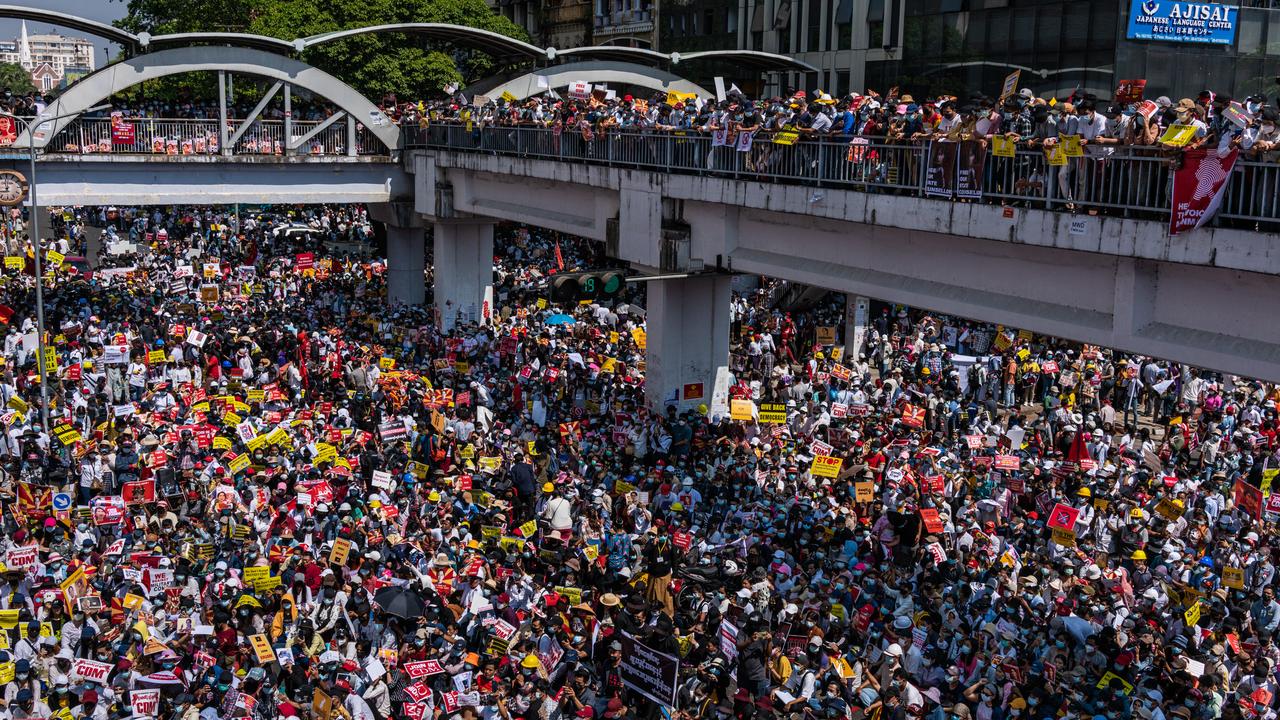
An extremely uncomfortable situation for China is unfolding on its doorstep — as a troubled nation rises up against its new rulers.
The southeast Asian nation of Myanmar — which shares a sprawling border with China to its northeast — began this week effectively cut off from the world as it’s new military regime cracked down hard on those who opposed its takeover from a democratically elected government three weeks ago.
It was takeover that was met with condemnation and disbelief from governments and human rights groups around the world.
The heavy crackdown on dissent since the coup — in which the army has used rubber bullets, tear gas and even slingshots to batter civilians — has drawn even more ardent criticism, amid fears that the nation may be bracing for a disturbing level of violence in the weeks to come.
However, as Myanmar’s army swooped in to arrest the nation’s civilian leader Aung San Suu Kyi and other democratically elected leaders from the National League for Democracy (NLD) in a series of raids on February 1 — China had an altogether different view on the proceedings.
A dry news piece in China’s state media the following day described the coup as a simple “cabinet reshuffle”.
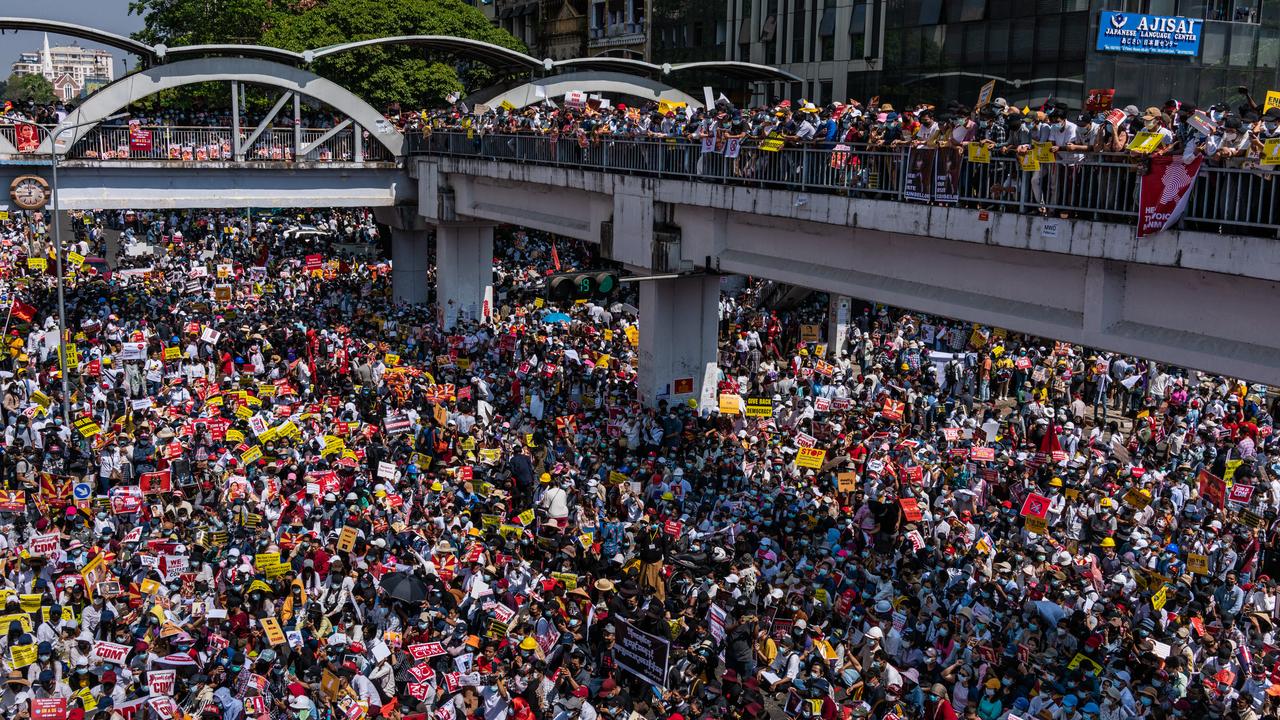
“Under the cabinet reshuffle, new union ministers were appointed for 11 ministries while 24 deputy ministers were removed from their posts,” the story read.
Beijing’s public statements in response to the coup have ranged from neutral to mildly critical at worst ever since, with perhaps the strongest criticism coming from an ambassador to Myanmar who said China was “unhappy with the situation.”
However, as the size of the protests hit astonishing levels this week, it’s clear that demonstrators in Myanmar aren’t just unhappy about their military rulers. They are also angry at Beijing — with the shows of resistance becomingly increasingly anti-Chinese in their tone.
Many of them believe that China not only knew about the military takeover beforehand, but that they sent soldiers over the border to assist the army.
Alarm bells have sounded over the fact that Chinese Foreign Minister Wang Yi met the current coup leader Senior General Min Aung Hlaing while visiting Myanmar just 20 days before the coup.
Disinformation and rumours over Beijing’s involvement have run wild on social media — with speculation that Chinese soldiers have infiltrated the nation and photos of “Chinese-looking” soldiers gathering in cities.
There are unverified reports of Chinese hackers being flown in to build a “great firewall” that would block the nation’s internet access — which has been slashed several times since the takeover.
In response, rallies have been held outside the Chinese Embassy in Yangon, with demonstrators holding signs in English and Chinese with slogans such as “support Myanmar, don’t support dictators” and “stop helping the military coup.”
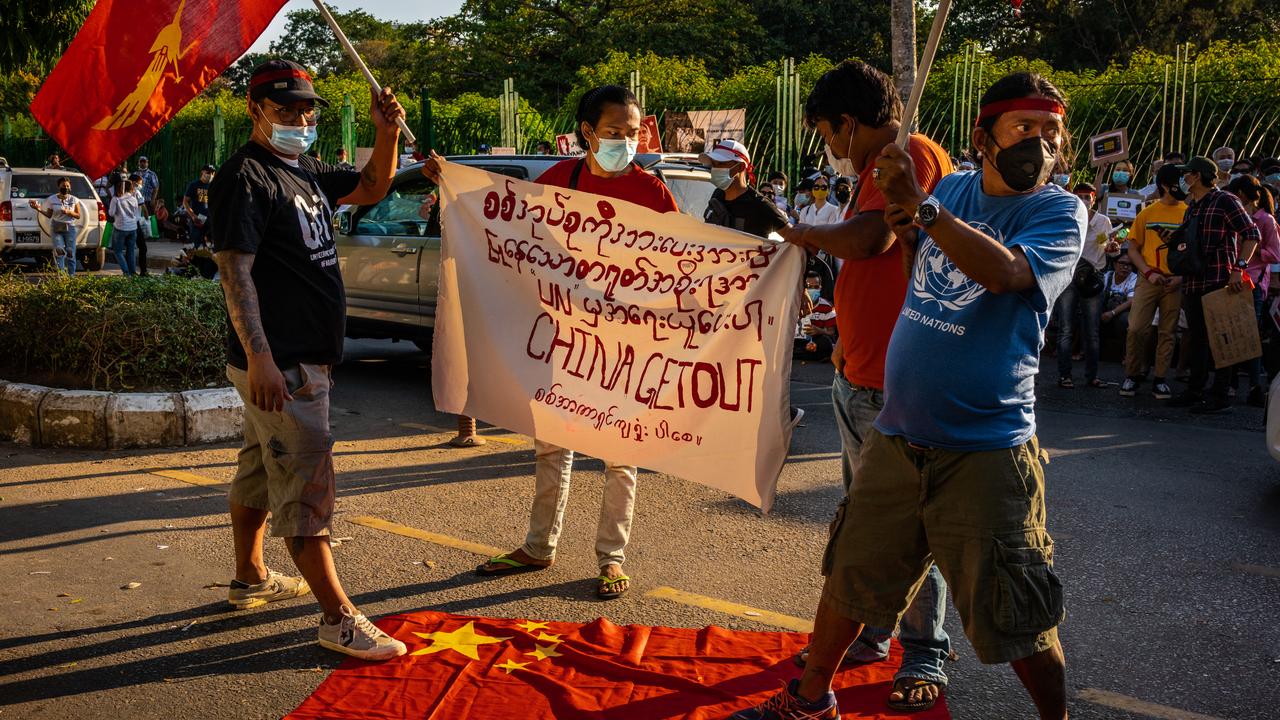
“China! Don’t make firewall to block internet in Myanmar,” another of the signs held up by protesters said.
There have been calls to boycotts all Chinese goods and services, and calls to smash up the natural gas pipeline linking China’s Yunnan province to Myanmar’s port of Kyaukphyu, a flagship infrastructure project.
China has hit back at reports of its involvement in the coup — saying the idea that it was sending soldiers and IT experts over in secret flights was “completely nonsense and even ridiculous.”
In a statement, China’s ambassador to Myanmar Chen Hai said that Beijing was not forewarned of the coup and that “the current development in Myanmar is absolutely not what China wants to see”.
It’s clear that many on the streets of Myanmar don’t see it that way, and experts believe that this is because of a strained relationship between the two nations that has grown increasingly complex in the past few years.
Anti-Chinese sentiment has a long history in Myanmar — which for decades has been gripped by rampant ethnic violence.
In particular, ethnic Chinese communities in Myanmar became the focus of racial violence in 1967 in a series of riots that soured relations between the two nations until 1970.
It was a long road to democracy for Myanmar, which wasn’t free of its former military junta until after its 2010 election, in which a civilian government successfully voted in.
Myanmar began to open up to the world after its trade and other economic sanctions were dropped by nations around the world — as a response to its steps towards democracy and an improvement in its human rights record.
Video from Mandalay today showing some of the thousands out on the streets, including students, engineers and farmers. Monks are expected to join this afternoon. As in Yangon, protests are the biggest in several days. #WhatsHappeningInMyanmar
— Frontier Myanmar (@FrontierMM) February 17, 2021
Read more: https://t.co/3I5sZ5Pxb4pic.twitter.com/quoxBN8w85
However, China’s investments in Myanmar have caused controversy — as Beijing has for decades remained close to its neighbour’s military elite by selling weapons and carrying out deals.
This combined with the ethnic tensions, that have never really gone away in Myanmar, have resulted in a hardened distrust of China in parts of the nation.
Foreign Policy analyst James Palmer said that recent Chinese investment projects have been major flash points in Myanmar, particularly the deeply unpopular Chinese-backed Myitsone hydropower mega-dam in the nation’s north.
“(The project) was suspended in 2011 following the move toward democracy,” he said. “Locals have decried the environmental impacts and forced relocations associated with such projects, while Beijing has been keen to get them restarted.”
This Tuesday, just days after taking over the nation, Myanmar’s military announced it was going to restart a number of stalled hydropower projects.
Social media went wild with rumours that this might include the Myitsone dam — which was not mentioned by name the junta’s announcement.
However, experts have cast doubts on idea that China would actively take part in a military coup in Myanmar or that they would even want a change of government there.
Enze Han, an associate professor of politics at the University of Hong Kong, told the Financial Times that China had a good relationship with the civilian government that was overthrown this month.
During a visit by Xi Jinping to Myanmar last year, civilian leader Ms Suu Kyi signed off on a string of Belt and Road Initiative infrastructure deals and China stood by her government when it faced international condemnation over the crackdown on Rohingya Muslims.
“In many ways, the relationship between the two countries has been stable under Aung San Suu Kyi,” said Mr Han. “That’s why I can’t see any reason why China would want the military to come back, with consequences like sanctions.”
Although Beijing seemed neutral in its first statements on the military coup, it appears to be slightly hardening its stance against the new rulers.
In his statement this week, China’s ambassador to Myanmar Mr Hai appeared to criticise the takeover saying the situation “absolutely not what China wants to see,”
However, he was diplomatic saying that China maintains good relations with both the National League for Democracy and Myanmar’s military.
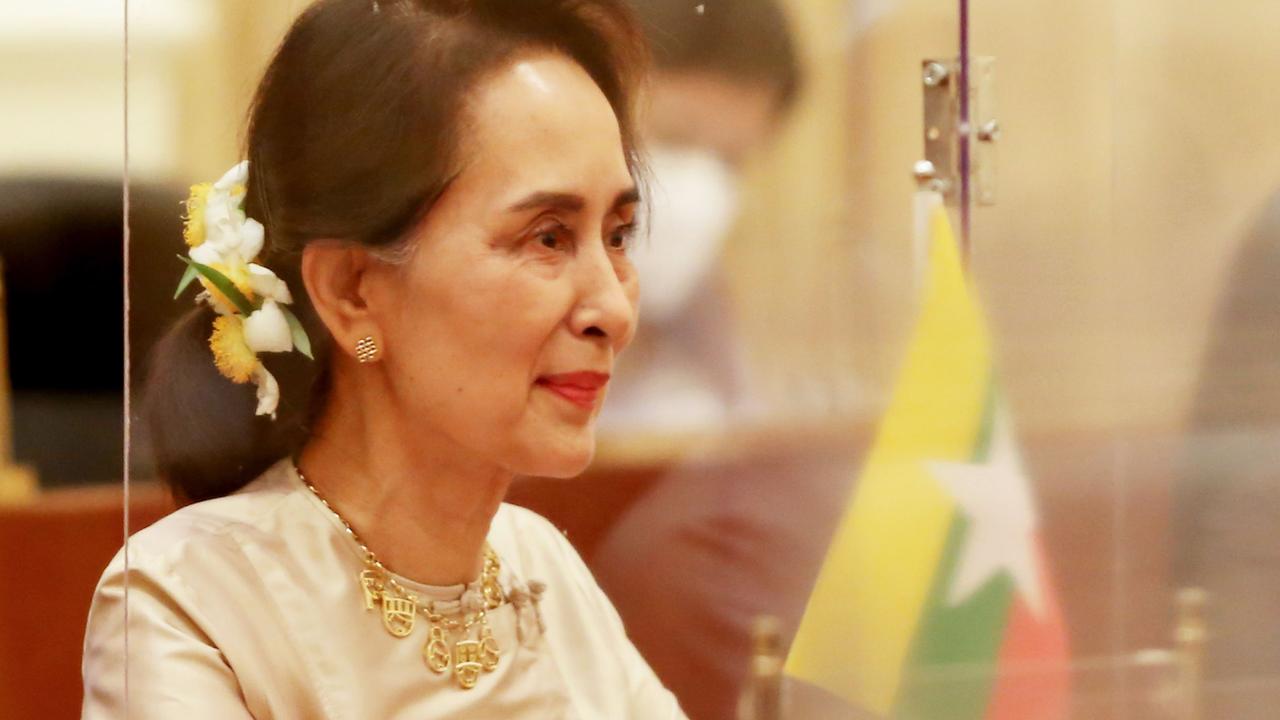
He said China hoped all parties in Myanmar “could handle the current problem through dialogue and consultation properly and lead the country back on track as soon as possible.”
Beijing wants things to go well in its southern neighbour, rather than to see it become unstable or even fall into chaos.
This week has shown that the threat of Myanmar falling into chaos is very real — with neither the army or the hundreds of thousands of protesters fighting against their rule looking as if they will back down.
On Wednesday, there were incredible pictures of tens of thousands of people packed onto the streets in the city of Yangon.
Residents of the city stopped their cars in the streets or at key junctions — their bonnets open in mass “breakdowns” — as a way of stopping any military advance.
The NLD was returned to government in a landslide in November’s elections, but the army said the polling was rigged.
Despite the resistance, there are grave concerns over what will happen now as the army shows no signs of relinquishing its control.
Tom Andrews, the United Nations’ special rapporteur on human rights in Myanmar, said earlier he was “terrified” of an escalation in violence.
He had received reports of troop movements around the country and feared the protesters were facing real danger.
“I fear that Wednesday has the potential for violence on a greater scale in Myanmar than we have seen since the illegal takeover of the government on February 1,” Mr Andrews said in a statement.
“I am terrified that given the confluence of these two developments — planned mass protests and troops converging — we could be on the precipice of the military committing even greater crimes against the people of Myanmar.”
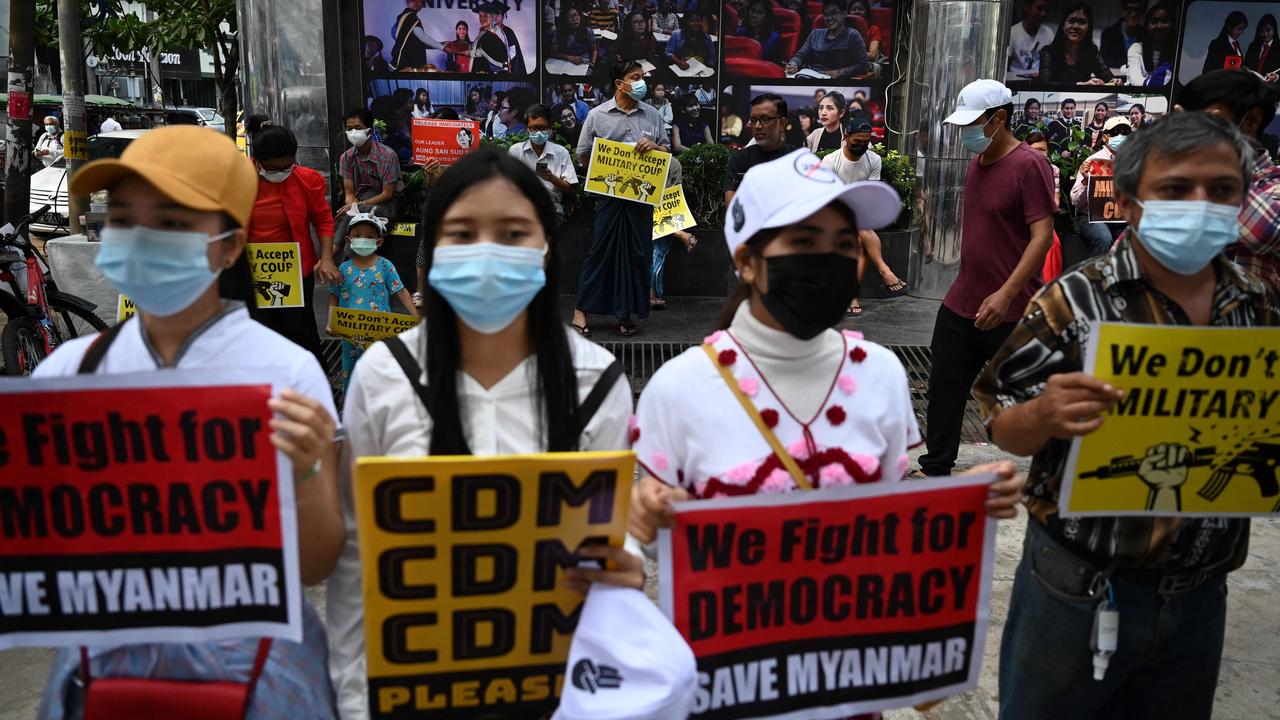
Rubber bullets, tear gas and even slingshots have been used against protesters so far, and one young woman remains in a critical condition in capital city Naypyidaw after being shot in the head last week.
Myanmar’s military has a history of crushing its critics with brute strength before the nation transitioned to a democracy began 10 years ago.
Armed forces chief Min Aung Hlaing, who led the coup two weeks ago, also led the 2017 crackdown on the Muslim Rohingya minority in the western state of Rakhine — which human rights groups say was carried out with “genocidal intent”.
“The security forces’ approach could take an even darker turn fast,” the International Crisis Group warned in a briefing released today.
“Soldiers and armoured vehicles have begun to reinforce the police lines and, should the generals become impatient with the status quo, could easily become the sharp end of a bloody crackdown, as has happened in the past.”




